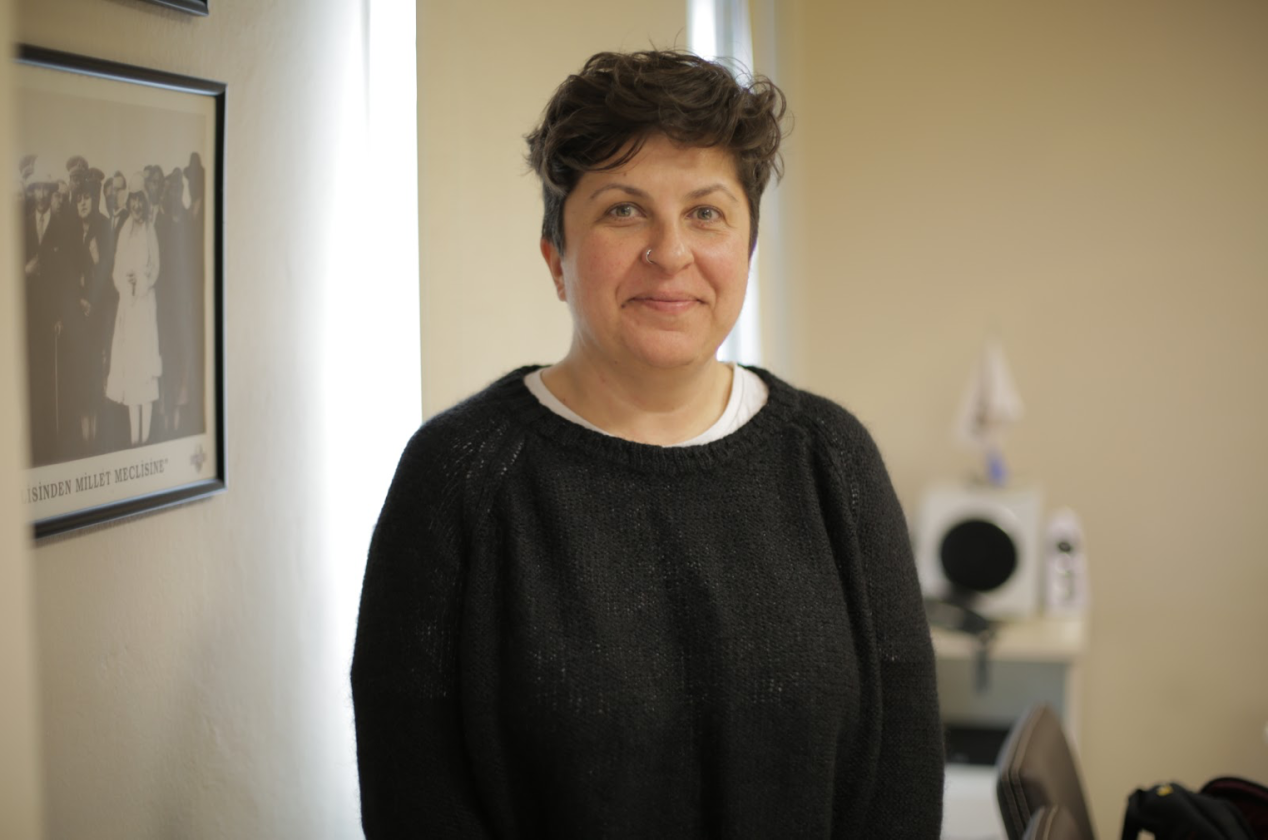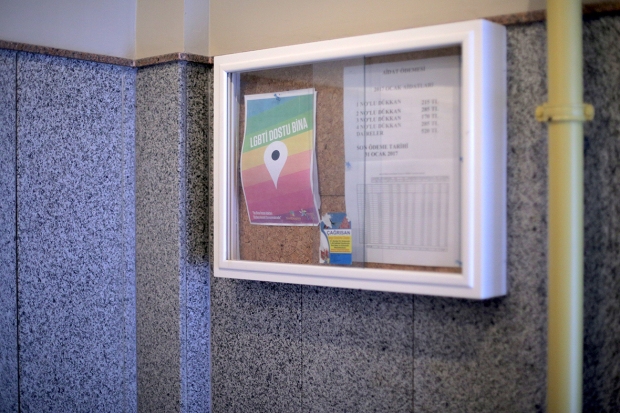Mahallede LGBTI, is a neighborhood* organization that works with apartment residents, neighborhood muhtars and shopkeepers for the LGBTIs to exist in their living spaces as they are. We talked about organizing in the neighborhood and Mahallede LGBTI’s activities with its representative Ada Ayşe İmamoğlu.
Source: “Bir mahalle örgütlenmesi: Mahallede LGBTİ” (“A neighborhood organization: Mahallede LGBTI (LGBTI in the hood),” Sivil Sayfalar, 31 Ocak 2017, http://www.sivilsayfalar.org/bir-mahalle-orgutlenmesi-mahallede-lgbti/
– What is the motivation behind Mahallede LGBTI?
Mahallede LGBTI started with the dream of building an LGBTI life in the neighborhood, of being a part of the local governance, of communicating with the LGBTI individuals who lead a life in their own corner of the neighborhoods. In fact, Mahallede LGBTI is a movement for visibility which is based on neighborhood organization. We face many difficulties in our living spaces on a daily basis. I have been a part of many stories of violence in my personal life. I have personally experienced this violence, based on the excuse of my outfit, based on my profile as a woman. But at some point you tell yourself, I will resist with my own way of being. Then your existence becomes political and you directly get involved in a struggle against the social norms. You start daring to say “none of your business” when it comes to your weight, your clothes, your gestures and your lovers. A feminist friend of mine once wrote about this, for instance Zeliş was a symbol of courage for our lives. She wouldn’t wear a bra in her white shirt and walk around proudly in Taksim like that. Boysan would wear such beautiful costumes in pride walks that he would teach people how to be happy and brave as they are. As Ada I miss them, yes, but they also help me keep going. We are a big family, sometimes some of us get tired and others come to the fore, those who rest catch up later. This is how we came to bear our rainbow flags with endless confidence in Gezi. Our battle grows for all the friends we lost. Struggling against the social pressure against LGBTIs is one of our basic tasks. We particularly struggle against the social pressure in the neighborhoods that intrudes into our houses, our private spaces.

Ada Ayşe İmamoğlu – Mahallede LGBTİ
– What are the activities that this visibility movement carry out?
Our gay friends have been going through cases of violence, like the youngsters of the neighborhood cornering them and harassing them, or house raids. In our times when the hate speech has become an instrument of the system, we have friends who committed suicide because of the social pressure or family violence, or hate murders. We had friends whose landlords came knocking at their door in the middle of the night, saying “this house should be empty in the morning”. Precisely because of this, we are working on a legal aid pamphlet. This pamphlet will be a reference for the LGBTIs’ right to accommodation. We have also prepared “LGBTI Friendly Building”, “LGBTI Friendly Place” labels with the support from Sivil Düşün. We put these labels on places and buildings around Beşiktaş, Kadıköy and Taksim. We will continue our work to exist as who we are in our living spaces without any compromising our appearance or our preferences. We want to choose pilot neighborhoods and make apartment visits. We aim to create a foundation for communication, by bringing the apartment managers and LGBTIs together in these visits.

– Mahallede LGBTI introduces a local organization model. With whom does this organization get in touch with?
We need to understand each other and talk; talk with each other, our neighbors, local shopkeepers and ourselves. The neighborhood organization includes a collaboration with many groups such as apartment residents, apartment managers**, muhtars***, shopkeepers and local governances.
– What kind of a relationship exist currently between the LGBTI individuals and local governance? At what does the local governance structure you are modelling with local administrators and muhtars aim?
Thanks to the great efforts of SpoD, there have been mayors who signed LGBTI-friendly municipality protocol on last election round [in March 2014]. Şişli is incredibly active in this aspect. The biggest trouble for lesbians is ob-gyn examinations. Our dear Aligül, who we lost in the last few years, went through such processes that still affects us. For instance, we still have friends who are yet to take the smear test, there are many lesbian friends who went through traumatic experiences. Şişli Municipality has set up a special, free of charge ob-gyn expert for lesbian and bisexual women. Think about it, local governments are constantly improving themselves thanks to the homosexuals that participate in their administration.
My personal dream is to apply that to the muhtar offices. Many friends including me are getting ready for muhtar elections. The first stop for the Mahallede LGBTI project is becoming muhtars who are responsible for the street, the ‘hood, the neighbor, the park and even the dogs and cats that live in the neighborhood. There will be LGBTI muhtars and they will destroy the othering language that the system devised. I start off with the principle “let’s keep our yards clean first”, I believe that one day the whole country will be a flower garden. When we build a union upon not the fear of the different but upon understanding, authoritarianism would be smashed and on it a forest will grow.
– Among the latest outcomes of Mahallede LGBTI is a short film. What’s the story of this film?
We shot the film “Being an LGBTI in the hood” in one of my friends’, who I’ve known for a long time, houses. My friend and I decided to make a film, just when I was struggling with coming up with words to express myself. “Being an LGBTI in the hood” tells our tiny resistance which says “I have the guts to step out onto my balcony”.
– Where has the film been screened? What will come of it next?
Our four-minute film, which we shot with Sivil Düşün EU Programme’s support, was shown at the Pink Life Queer Fest on 12-19 January in Ankara and we received an incredible reaction. The film will greet the audience at Queer Fest Istanbul as well. After that, I aim to talk to more friends and shoot a feature film together, a film that will allow us to tell more of our problems.
– You followed a diverse method by not showing the faces in the film. There are those that define this as queering the cinematic language. How do you explain your attitude?
We generally look at people’s physical appearance before knowing that person while we are talking with each other. I’d like to take a stand against that and want to produce ideas in contrast. Because you ought to wonder about, ask questions to and feel that person before being interested in his/her appearance. I wanted to tell the story with little details that things like the magnets on the fridge, instead of how that person looks like. We looked for what the alternative opposing the dominant narrative can be and we wanted you to be a part of the narrator’s story while he hosts you in his house.
– Mahallede LGBTI is a visibility movement in its own, what does it say about the visibility of LGBTI in the media?
The stories of violence that LGBTI communities endure are not stressed as much as other news of violence. Yet when you highlight and distinguish women as “university student”, “working woman”, you feed the violence and approve it. We, as the Mahallede LGBTI crew, want to have the same impact in each news about women. It was very enlightening for me to participate in News Workshop with Women Focused Institutions together with women focused institutions and media platforms and to think about civil society media. It opened new paths of learning and gathering information, more importantly of asking questions. I started asking the right questions at the right time and receiving the right answers. One of the most important issues in our crew was the news of violence and archival searches. A group of people which are exposed to violence and discrimination the most, does not have a news archive! This workshop has given me the opportunity to tidy up this mess within ourselves and to present the news in a way that creates the most impact.
This interview was prepared and published within the scope of Civil Society Media Media Workshop with Women Focused Institutions, a collaboration between Sivil Sayfalar, Reçel Blog, Kadın Adayları Destekleme ve Eğitme Derneği (Support and Education for Female Candidates Association), Swedish Consulate General.
Translator’s Notes:
*Mahalle (neighborhood) is the smallest administrative unit in Turkish local governance, but it is also a semi-public social setting. Historically, mahalles have been defined by ethnic, religious and class homogeneity, and sometimes in cases of chain migration, mahalles have been made up of people from the same hometown. This homogeneity meant that primary relationships and fictive kinships dominate the mahalle space, people looking out for each other but also guarding the boundaries of said homogeneity. Although such homogeneity can not always be found anymore in the context of metropolitan cities, mahalles are still settings where being different can be a problem.
** Apartment managers are residents who are elected by the rest of the residents to manage the paperwork and maintenance related efforts. The manager is an unpaid post, but it is mandatory to have one, therefore it is an official title in local bureaucracy.
*** Muhtar is the elected administrator that is responsible for the neighborhood, also for the villages. They are often elder people who have been a long time resident, who is educated and knows most of the residents.